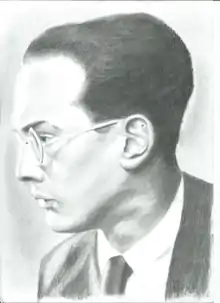
Jerzy Fitelberg (May 20, 1903 – April 25, 1951) was a Polish-American composer.[1]
Biography
Son of Grzegorz Fitelberg, Jerzy was born in Warsaw. He first studied music with his father. At a young age, his father had him play percussion in the orchestra of the National Theatre, Warsaw to gain experience.[2] He subsequently studied in Moscow.
From 1922–1926 he studied composition with Walter Gmeindl and Franz Schreker at the Berlin University of the Arts. In 1923 the University helped him get a deferment for the Polish military draft .[3]
In 1927 he re-orchestrated Arthur Sullivan's music for "The Mikado" for Erik Charell's re-staging as an operetta-revue in Berlin's Grosses Schauspielhaus. (Review in the Times (London) September 2, 1927)
In 1928, his String Quartet no. 2 won first prize in a competition organized by the Association of Young Polish Musicians in Paris.[1]
His first violin concerto made a major impression on the 1929 International Society for Contemporary Music concert. Music critic Henry Prunieres remarked "The violin concerto...[was] delicate, sensitive with a fine feeling for orchestral resource."[4] His works were heard at subsequent ISCM concerts of 1931, 1937, 1946 and 1951.[5]
Escaping the Nazis, he first traveled to Paris in 1933. There his music was published by Editions Max Eschig.[5] His String Quartet no. 4 won the Elizabeth Sprague Coolidge Award administered by the Library of Congress. The work had its premiere on April 9, 1937 at the Library of Congress.[1]
He then emigrated to New York City, arriving on May 15, 1940.[6] Among the first works he composed in his new city were those reminiscent of Poland.[5] In 1945, his fifth string quartet was awarded with a prize from the American Academy of Arts and Letters.[7]
His application for US Citizenship was filed on May 26, 1947. At the time he was living at 244 West 72nd Street in New York City.[8]
He died in New York in 1951.
Style
Fitelberg said that his style of composition was similar to "the energy and high voltage music of Stravinsky, a focus on linear and harmonic complexity as in Hindemith, and colors of contemporary French music (such as Milhaud), as well as styles of satire.[9]
Legacy
Jerzy Fitelberg's manuscripts are housed in the Music Division of The New York Public Library for the Performing Arts.
List of works
Operas
- Henny Penny
Orchestral works
- Suite No. 1 (1925)
- Suite No. 2 (1928)
- Concerto for Strings (1930) - transcription of the "String Quartet No. 2" (1928)
- Concert Piece (1937)
- The Golden Horn (1942)
- Epitaph (1943)
- Nocturne (1944)
- Polish Pictures, suite (1946)
- Symphony for Strings (1946)
- Sinfonietta (1946)
- Concert Overture (wind orchestra)
- Der schlechtgefesselte Prometheus, (suite from a ballet)
- Symphony No. 1 (?)
- Symphony No. 2 (?)
Concertante works
- Violin Concerto No. 1 (1928 ; rev. 1947)
- Piano Concerto No. 1 (1929)
- Cello Concerto (1931)
- Piano Concerto No. 2 (1934 ; rev. 1950)
- Violin Concerto No. 2 (1938)
- Concerto for Trombone, Piano and Strings (1947)
- Clarinet Concerto (1948)
Choral works
- Three Polish Folksongs
Chamber music
- Quintetto (flute, oboe, clarinet, bass clarinet, trombone) (1929)
- Sonatine for 2 violins (1935)
- Sonata, 2 violins, 2 pianos (1938)
- String Quartet No. 1 (1926)
- String Quartet No. 2 (1928)
- String Quartet No. 3 (1936)
- String Quartet No. 4 (1936)
- String Quartet No. 5 (1945)
- Serenade (Viola, piano), 1943
- Serenade (violin, double bass)
- Seven Caprices for viola and piano (1944)
- Capriccio (flute, oboe, B♭ clarinet, bass clarinet, trombone or bassoon) (1948)
- Concerta da camera (violin, piano)
- Duo (violin, cello) (1948)
- Sonata (solo violoncello) (1948)
- Sonata No. 1 for piano (1933)
- Suite for organ (1949)
- 3 Mazurkas (piano) (1932)
- What is Benjamin?: a musical tale for children to read and to play on the piano (1950)
Film music
- Poland Fights On (1943)
- Pre-war Poland (1945)
As author
- Fitelberg, Jerzy. "Aspects of instrumentation today." Modern Music vol. 9, no. 31 (Nov.-Dec. 1931), p. 28-30.
- Fitelberg, Jerzy. "News from overseas." Modern Music vol. 23, no. 1 (Winter 1946), p. 42-44.
- Fitelberg, Jerzy. "Forecast and review." Modern Music vol. 9, no. 4 (May – Jun. 1932), p. 184-87.
References
- Cadenbach, Rainer. "Jerzy Fitelberg" in Franz Schrekers Schüler in Berlin: biographische Beiträge und Dokumente. Schriften aus dem Archiv der Universität der Künste Berlin, Band 8. Berlin: Universität der Künste Berlin, 2005, p. 25-28.
External links
- Jerzy Fitelberg papers, 1921-1952 Music Division, New York Public Library for the Performing Arts.
Notes
- 1 2 3 "Jerzy Fitelberg, 48, A Polish Composer," New York Times (April 27, 1951), p. 23.
- ↑ Cadenbach, p. 25.
- ↑ Cadenbach, p. 25-26.
- ↑ Henry Prunieres, "The Festival of Contemporary Music," New York Times (Jul. 31, 1932), p. X4.
- 1 2 3 Cadenbach, p. 27.
- ↑ "Jerzy Fitelberg" in New York Passenger Lists, 1820-1957 on Ancestry.com.
- ↑ Cadenbach, p. 28.
- ↑ "Record for Jerzy Fitelberg," Index to Petitions for Naturalization filed in New York City, 1792-1989 on Ancestry.com.
- ↑ Cadenbach, p. 26.